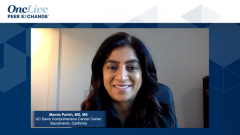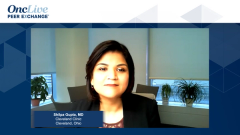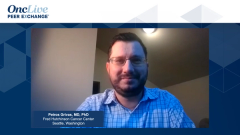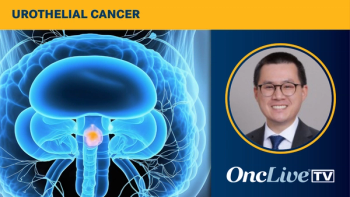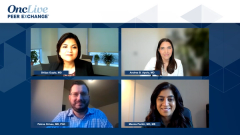
Metastatic Urothelial Carcinoma: Intensifying Maintenance Immunotherapy
Shared insight on clinical trial data behind the intensification of maintenance immunotherapy in patients with metastatic urothelial carcinoma.
Episodes in this series

Transcript:
Shilpa Gupta, MD: Andrea, you’ve done so much work with cabozantinib-nivolumab combinations in rare tumors and bladder cancer. We’re all leading the MAIN-CAV trial. Is it a good strategy to build on avelumab with drugs like cabozantinib? Even though it didn’t show great responses in the single-agent maintenance setting in the ATLANTIS trial, the takeaway is that it’s still a suitable partner for immunotherapy. I’d love to hear your insights for that trial combination.
Andrea B. Apolo, MD: I ran the phase 1 trials of cabozantinib-nivolumab and cabozantinib, nivolumab, and ipilimumab. We saw beautiful responses in patients with bladder cancer. We saw a 42% overall response rate in the second-line setting and a high CR [complete response] rate of 21%, so half of those responses were CRs. Cabozantinib boosts the effects of immunotherapy, such as nivolumab.
I’m excited about the MAIN-CAV study because we’re trying to take a maintenance therapy and see if we can improve upon it with an additional therapy in a randomized fashion. We’ll learn a lot from the trial. I hope it will be active and a good option for patients if it shows an improvement in outcome.
Shilpa Gupta, MD: Thank you, Andrea. Mamta, you also have another maintenance study called the TROPHY-U-01 cohort 5, which it’s a more aggressive approach. It uses sacituzumab, which is also an antibody-drug conjugate like chemotherapy, and adding to zimberelimab, which is their own checkpoint inhibitor. What’s your take on that? After patients come off chemotherapy, are they going to be excited about the idea of coming to the clinic every week? How much are patients willing to do to intensify this setting?
Mamta Parikh, MD, MS: Petros also mentioned the TROPHY-U-01 cohort 5 study, which will look at sacituzumab plus PD-1 inhibitor zimberelimab vs zimberelimab alone vs avelumab. It will give us interesting data. It will be challenging for patients to be on that intensified therapy. Similarly, with MAIN-CAV, we’ll get information about how patients tolerate intensified therapy. With sacituzumab, there are more challenges in terms of weekly infusions potential for cytopenias and GI [gastrointestinal] adverse effects, so we’ll have to see if the tolerability is OK.
Going back to the JAVELIN long-term studies, we’ve seen that some patients who were in PR [partial response] or stable disease did get further improvement from the maintenance therapy. There’s the possibility that intensified therapy could further push some patients who had stable disease or partial response to a CR [complete response]. That’s compelling. It will be interesting to see the duration of therapy for all these things, even with intensified approaches.
Shilpa Gupta, MD: Thank you. It’s exciting that we’re even talking about this. In the real world, are you talking to patients about stopping maintenance therapy if they have been on it for about a year and are doing well, or do you continue avelumab? In the MAIN-CAV study, 2 years is the maximum because we don’t believe they need indefinite treatment. I’d love to hear when you decide to stop maintenance avelumab for a standard of care.
Mamta Parikh, MD, MS: I sometimes consider it after 2 years, and I might be a little more conservative than others. That’s driven by data looking at pembrolizumab in the advanced setting, where 2 years was the norm for how long patients were continued on treatment and if they maintained their response off therapy.
I often take into consideration adverse effects from checkpoint inhibitor therapy. We underappreciate the fatigue that sometimes comes with immune checkpoint inhibitors. It’s 1 of the most common adverse effects of therapy. When you’re giving patients this treatment for a long period of time, that becomes an issue for some patients. I’ve had some patients who had other adverse effects that led to discontinuation. But otherwise, at 2 years, I’ve discussed stopping.
Transcript edited for clarity.


